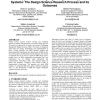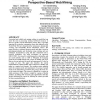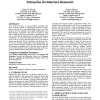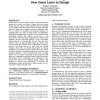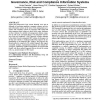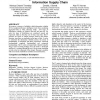119
click to vote
DESRIST
2009
Springer
14 years 12 months ago
2009
Springer
Design science research involves creating and evaluating innovative methods and approaches to be used in design practice. We present an approach to be used in the process of desig...
DESRIST
2009
Springer
15 years 3 months ago
2009
Springer
118
click to vote
DESRIST
2009
Springer
15 years 5 months ago
2009
Springer
In this paper, we describe the concept of ontological design. We show how ontologies can be used as cognitive maps of complex, ill-structured, plastic problems. They can be used t...
100
click to vote
DESRIST
2009
Springer
15 years 5 months ago
2009
Springer
Online communities are increasingly important in modern social life. Yet, the diverse collection of guidelines that have directed online community design may not be keeping pace w...
102
Voted
DESRIST
2009
Springer
15 years 5 months ago
2009
Springer
As a result of the rigor vs. relevance debate, researchers who focus on design research on organizational problems are beginning to focus on their research methodology’s rigor. ...
103
click to vote
DESRIST
2009
Springer
15 years 6 months ago
2009
Springer
In information system development, end-users often participate in design and in many cases learn to design their own system. Design, however, requires a distinct approach that use...
125
click to vote
DESRIST
2009
Springer
15 years 6 months ago
2009
Springer
Against the background of the current financial crisis and an aftermath of increasing regulation, companies enhance and integrate information systems in the areas of risk manageme...
DESRIST
2009
Springer
15 years 6 months ago
2009
Springer
Design science emphasizes the connection between knowledge and practice by showing that we can produce scientific knowledge by designing useful things. However, without further g...
DESRIST
2009
Springer
15 years 6 months ago
2009
Springer
We propose a measure of reliability called information volatility (IV) to complement Business Intelligence tools when considering aggregated data or when observing trends. Two typ...
DESRIST
2009
Springer
15 years 6 months ago
2009
Springer
Innovations in health care are often characterized by complexity and fuzzy boundaries, involving both the elements of the innovation and the organizational structure required for ...
